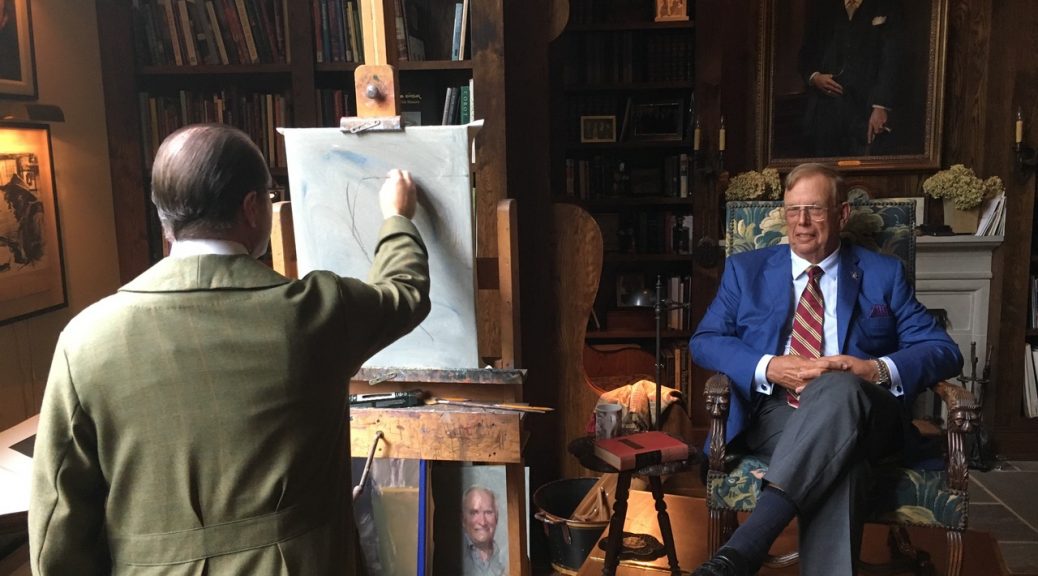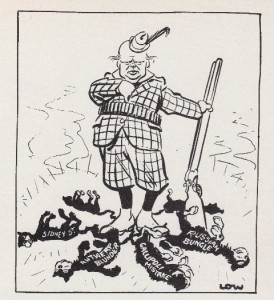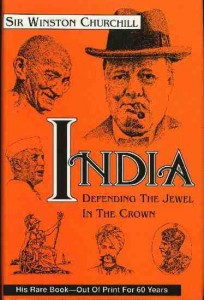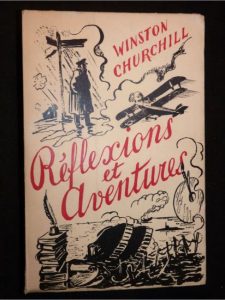
Nashville (1). Winston Churchill: Current Contentions and Things That Go Bump in the Night
***
Churchill in Nashville, 1932
Winston Churchill was here on his 1932 lecture tour. He especially liked Nashville, Atlanta, New Orleans, Cincinnati, and Ann Arbor—the latter not too far from Hillsdale College. “And who would miss Chattanooga,” he wrote, “lying in its cup between the Blue Ridge and Lookout Mountain?”
East, west, north, and south he rode the rails, “living all day on my back in a railway compartment and addressing in the evening large audiences.” His theme was Anglo-American unity. He concluded, rather startlingly for someone with his background: “It is the hardest work I have had in my life.”
Aside from making money—something he was always short of in those days—he was keen to visit battlefields of the Civil War, which he would describe in his History of the English-Speaking Peoples. At Murfreesboro, he observed “the greatest bravery by both sides.” The Federals lost 9000, Braxton Bragg’s Confederates over 10,000. “The Federal hold on Nashville was unshaken, and Bragg withdrew to cover Chattanooga. Murfreesboro gave the impression of a drawn battle….”
Churchill viewed the Civil War as Lincoln did, “with malice toward none and charity for all”—as a milestone toward what the Constitution calls “a more perfect union.” He understood and admired the courage and devotion of both sides. I doubt he would approve tearing down any of their statues. But that’s just my opinion.
And because he had studied the Civil War, he knew on December 7th, 1941 that World War II was won. He didn’t attempt to guess how long it would take. But he knew for certain that “America was in the war, up to the neck, and in to the death.”
Current Contentions

Alas, this noble spirit is the subject of current contentions, and bad movies from “Dunkirk” to “The Crown.” Not a month passes when he is not accused of something dreadful, from alcoholism and racism to misogyny and warmongering. Confronting this busy industry is the purpose of my book.
Critics often set Churchill up as the savior of 1940, then tear him down with a familiar litany: his self-centeredness; his liking for gas warfare and carpet bombing; the rude things he said about Hindus or Jews or Muslims; his disdain for the uncivilized, meaning anyone other than card-carrying Englishmen.
The assault is both personal and political. The personal includes charges that he was a school dunce, a failure in marriage, avid for conflict. There are side-claims about his parents. Lord Randolph died of syphilis. Lady Randolph slept with 200 men. His brother Jack was not Lord Randolph’s son.
Policy critiques range from what he did—like defending Antwerp and attacking the Dardanelles—to what he didn’t do—not bombing Auschwitz, not feeding occupied Europe, not stopping the Bengal famine.
Where do people get these notions? The scholar Harry Jaffa said that detraction of the great has become a passion for those who cannot suffer greatness—a skewed vision of the egalitarian principle, the theory that there are no great figures, we are all the same.
We may not claim that Churchill was infallible. It diminishes him to treat him as superhuman. On some topics in the book, accomplished scholars have catalogued his failings. I acknowledge these. But I offer certain exculpatory, but more obscure facts.
What to Know
The first thing to know about Churchill is that there is more to him than 1940. Sir Martin Gilbert, his great biographer, wrote: “As I open file after file of Churchill’s archive, from his entry into Government in 1905 to his retirement in 1955, I am continually surprised by the truth of his assertions, the modernity of his thought, the originality of his mind, the constructiveness of his proposals, his humanity, and, most remarkable of all, his foresight.”
The “macro-Churchill” thought deeply about the nature of humanity and its institutions. The “micro-Churchill” helped to solve intractable problems. In 1921, he helped to secure Irish independence. In Cairo around the same time, he drew boundaries of today’s Middle East.
This was an act some say we should not thank him for. Yet he established a stable Jordan, which is there yet. He confirmed Britain’s commitment to a Jewish national home, which is also there. Churchill also proposed a Kurdish homeland. Let us, he said, “protect the Kurds from some future bully in Iraq.” That’s just Winston being silly, the Foreign Office said. We’ll never have any trouble from Iraq.
 In the 1930s he opposed self-government for India, and lost. He then sent a message to Gandhi… “Use the powers that are offered. Make the thing a success.” Gandhi actually admired Churchill. Since 1906, in fact. “I have a good recollection from when he was in the Colonial Office,” Gandhi said. “I have held the opinion that I can always rely on his sympathy and goodwill.”
In the 1930s he opposed self-government for India, and lost. He then sent a message to Gandhi… “Use the powers that are offered. Make the thing a success.” Gandhi actually admired Churchill. Since 1906, in fact. “I have a good recollection from when he was in the Colonial Office,” Gandhi said. “I have held the opinion that I can always rely on his sympathy and goodwill.”
Liberal Reformer
As a young statesman, Churchill campaigned for a “minimum standard” guaranteed by the state. But he called socialism “the philosophy of failure, the creed of ignorance, the gospel of envy.” He strove to help the needy while not dislocating the system that generated that help. “Churchill’s writings and speeches are full of reflections and philosophy that offer food for thought,” wrote the historian Paul Addison. “It is rare to discover in the archives the reflections of a politician on the nature of man.”
In the first part of the book, covering Churchill’s early youth, I consider his mother’s supposed indiscretions, the parentage of his brother Jack, his early troubles with education, and what really killed Lord Randolph Churchill. But I think you’ll most enjoy Chapter 1—the lighthearted myth that Churchill was part Native American. Like Elizabeth Warren. He himself believed this, and was proud of it.
* * *
Continued in Nashville (2):The Myth of Churchill’s American Indian Ancestors
Note: Winston Churchill, Myth and Reality is now available in paperback, with a lower price for the Kindle edition. Click here.








One thought on “Nashville (1). Winston Churchill: Current Contentions and Things That Go Bump in the Night”
Wow, that was very interesting, I wish I could have been there.
Anita
Comments are closed.